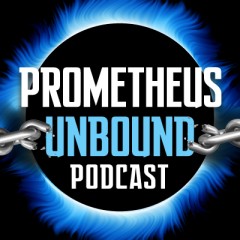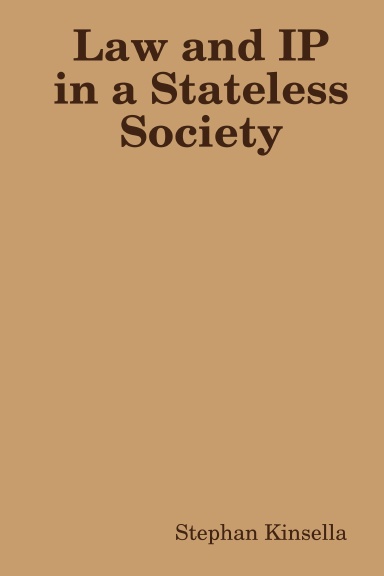In the historical “Retrospective” section of Wendy McElroy’s 2011 Libertarian Papers article “Contra Copyright, Again,” she discusses the beginnings of the modern libertarian anti-IP movement in the 1980s, spearheaded primarily by her and Samuel Konkin III (“SEK3”). This resulted in a 1983 debate on IP between McElroy and J. Neil Schulman (“The Great IP Debate of 1983“), each of whom later published papers based on their presentation at that debate (McElroy’s is reprinted in “Contra Copyright, Again,” and first published in 1985; Schulman’s “Informational Property — Logorights,” in 1990, in the Journal of Social and Biological Structures, 13 no. 2, pp. 93–117). I discuss some of this in “The Origins of Libertarian IP Abolitionism,” “The Four Historical Phases of IP Abolitionism,” and “The Death Throes of Pro-IP Libertarianism.”
I had previously thought McElroy’s 1985 “Contra Copyright” was the earliest published work by a modern libertarian mounting a comprehensive and explicit attack on IP as such (even SEK3’s “Copywrongs” was not published until 1986). There was earlier writing skeptical of IP by Hayek, Rothbard, and Leonard Read, but these pieces were either not completely anti-IP (Hayek, Rothbard) or were not comprehensive and sustained (Read) (“The Four Historical Phases of IP Abolitionism”).
However, in a recent Facebook thread, Less Antman informed me that when he was publisher of Caliber, the California LP’s newsletter, it published McElroy’s article “On the Subject of Intellectual Property” in its Dec. 1981-Jan. 1982 issue. He sent the PDF and a text version to me, an edited version of which appears below (PDF version; thanks to Ganine Van Alst for copyediting assistance). The article is a precursor to “Copyright and Patent in Benjamin Tucker’s periodical Liberty,” which appeared as a chapter in McElroy’s excellent 2003 book, The Debates of Liberty: An Overview of Individualist Anarchism, 1881-1908. This appears to be McElroy’s first published work on the topic of IP and, thus, the first comprehensive and explicitly anti-IP piece by a modern libertarian ever published.
McElroy sent me this email concerning her reflections about this piece and her current thinking on IP:
As a matter of preserving an accurate record, I do not like to rewrite articles from earlier years and, so, I did no editing. Nevertheless, my views on IP have changed in significant ways since 1981 and a few prefacing notes are required.
First and foremost, I no longer believe that patent or copyright by virtue of contract is either feasible or desirable. In fact, I think it would be incompatible with a libertarian legal system. I credit Stephan Kinsella with prompting this gradual drift in my position.
Originally, I took a vaguely Rothbardian view of IP; namely, I argued that a copyright claim could properly exist only as the result of an explicit contract and it would be binding only upon the agreeing parties. Huge logistical problems are immediately obvious. For example, how do you maintain a copyright on a book that is left lying around for others to read? I was not comfortable with the assurance “the market will evolve an answer” but I accepted it as the best I had.
I no longer do so. There are simply too many contradictions in “copyright by contract.” Consider the person who buys a physical book. Even diehard IP advocates agree that a purchaser owns the book itself and is merely constrained from reproducing it. But the only way to maintain a copyright by contract would be to deny the purchaser has any property in the book at all. Otherwise he could sell it to a secondhand store and the material within would be immediately and utterly unprotected. In order to maintain the protection, the copyright holder must deny that even the physical book can be owned by anyone else but him. Inserting a clause that bans resale into the original contract would not resolve the issue. Ownership means the “use and control” of a good, including disposing of it. If the copyright holder controls the terms on which the physical book can be sold, then he is asserting an ownership claim to the object itself and one that is superior to the purchaser’s.
Another reason I came to reject copyright by contract is that its enforcement would lead to an unjust and unlibertarian system of law. The purpose of a libertarian legal system is to provide reasonable restitution to victims. There are compatibility problems with copyright and restitution. Consider the case of a person who downloads a song. The purpose of restitution is to make the victim whole, perhaps with some additional compensation, perhaps not. (Disagreement exists on the justice of additional compensation but not on whether the overall compensation should be reasonable; otherwise, it is not just.) Yet the music industry and the courts have penalized people hundreds of thousands of dollars for a handful of downloads. To maintain IP, they must do so. If the courts assessed a download in terms of quadruple damages or some other reasonable sum, then there would be no incentive for people to eschew downloads. The chances of being caught are negligible, as would be the cost of being caught. One of the only ways left to minimize the number of downloaders is to make the laws draconian and severely punish a scattering of offenders as a cautionary tale to others. This moves the legal system away from justice and from restitution.
Yet another aspect of IP and libertarianism are incompatible: the incredible policing of individuals which would be necessary to prevent the ‘crime’. The immense free flow of information over the Internet means that more and more invasive methods are being used to monitor peaceful behavior. Now the advent of 3D printers has the potential to make the downloading and creation of duplicate goods as convenient as the downloading of music. This potential would devastate patents, of course. The only way to protect patents would be to monitor, restrict or ban people’s use of 3D printers. At every turn, as technology brings greater freedom and prosperity, IP is there to try and seize control … if not of the technology itself, then of individuals.
The race is on between freedom and IP, with government standing solidly and with both fists on the side of IP. And this is yet another change in my attitude from 1981. I now fully understand the vital importance of opposing copyright and patent.
ON THE SUBJECT OF INTELLECTUAL PROPERTY
By Wendy McElroy
(Published in Caliber December 1981-January 1982 Edition)
The question of what can be the proper subject of ownership — what is property? — is an important theme of libertarianism.
It arises in discussion of such diverse topics as slavery, pollution, animal rights and intellectual property. It is with intellectual property (by which is commonly meant, copyright and patent) that the question becomes unusually difficult, for what is being claimed is the ownership of intangibles, of ideas. The title of a recent book, Who Owns What Is In Your Mind?, concretizes a commonsense objection to intellectual property; most people would loudly declare, “no one owns what is in my mind!” Yet, if the information you have is a chemical formula which you accidentally glimpsed, do you have the right to market it as your own over the protests of the chemist who worked a lifetime to perfect it? Do you have the right to publish a book with characters named John Galt and Dagney Taggart? And if not, why not?
Intellectual property was the subject of intensive and unsurpassed debate within the pages of Benjamin Tucker’s libertarian periodical Liberty (1881-1908). Because of this, the best presentation of this question is an overview of the debate. The citations which appear directly after quotations refer to the appropriate issue and page of Liberty.
Although it is usually contended that the intellectual property debate was over the ownership of ideas, this is not quite accurate. James Walker — who wrote under the pseudonym of Tak Kak — was a leading opponent of copyright and patent; he stated, “My thoughts are my property as the air in my lungs is my property…” (March 21, 1891, 4) Both sides of the debate agreed that each man owns his own thoughts which he is free to express or not, as he pleases. [continue reading…]




 A few weeks ago, my position on intellectual property (IP) shifted. I abandoned the possibility that copyright by contract could function within a libertarian framework.
A few weeks ago, my position on intellectual property (IP) shifted. I abandoned the possibility that copyright by contract could function within a libertarian framework.
 Nelson Loftin has produced a print version of my recent
Nelson Loftin has produced a print version of my recent  Kinsella on Liberty Podcast
Kinsella on Liberty Podcast

Follow Us!